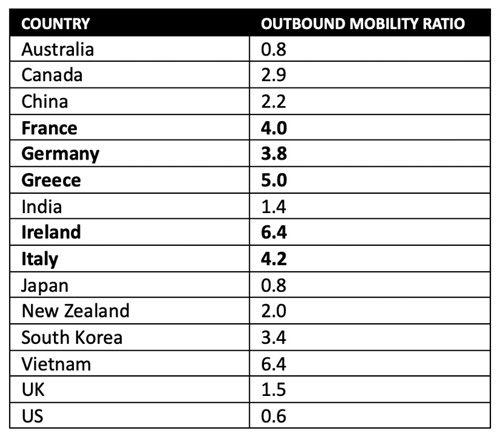Three-quarters of international students in Germany say the country was their first choice
- A DAAD survey conducted during the pandemic found that over 8 in 10 international students studying in German universities would recommend their experience to others
- Accommodation issues were the main challenge noted by surveyed students
- Among domestic students who travelled outside of Germany for study programme, those who chose a destination outside of Western Europe were more likely to report that their experience contributed to personal growth and confidence
The German Academic Exchange Service (DAAD) has published the results of its first International University Benchmark (BintHo) survey. This was conducted among 117,000 domestic and international students enrolled in German higher education institutions in the 2020/21 winter semester.
Survey finding highlights include high satisfaction among international students at German universities, problems securing accommodation, and the importance of part-time work and of English-taught programmes. In terms of outbound mobility, the survey found that while Western Europe remains the most common destination for German students studying abroad, students who chose to go farther afield tended to be more excited about their experiences.
Germany climbs the ranks of leading study destinations
Germany has become an increasingly popular destination for international students; enrolments have been steadily climbing. In 2021/22, they reached roughly 350,000. The DAAD survey found that Germany was the first choice of destination for 76% of international students.
Most of the international students surveyed were enrolled in degree programmes at universities or universities of applied sciences. Almost half were studying for a master’s (47%), with the remainder in bachelor’s (35%) and doctorate (12%) degrees.
Half of students were receiving instruction exclusively in English – highlighting the importance of English-taught programmes in European countries where the native language is not English. A 2022 Studyportals study found that Germany was the most searched-for destination for English-taught programmes in Europe, followed by the UK and Netherlands.
Nearly half of degree-seeking students were working part-time prior to or while at university, and they were much less likely than exchange students to have received a scholarship (17% versus 57%, respectively).
The most cited reasons for choosing Germany were:
- Attractive range of courses and good conditions for study (91%)
- Chance to obtain an internationally recognised degree (88%)
- Good job prospects after graduation (81%)
- Freedom from having to pay tuition fees in almost all federal states (79%)
(However, a separate survey conducted in 2021 by Expatrio/DEGIS found that the lack of tuition fees was by far the top draw for international students coming to Germany.)
More than half of international students said they managed to get a place at their German university of choice. The top factors influencing students’ choice of German institution were:
- Specific course content (58%)
- Good reputation (53%)
- Freedom from tuition fees (52%)
- Availability of English-language study programmes (48%)
A strong majority (82%) said they would recommend their current higher education institution in Germany to others.
Accommodation woes
Finding accommodation was a major problem for many of the surveyed international students (60%) who came to Germany for 2020/21 studies (as it is for international students going to most major destinations these days). Among those students, the majority said they “would have welcomed more support from points of contact at their higher education institution.”
Interest in staying on in Germany
About 6 in 10 surveyed international students either “definitely” wanted to remain in Germany after studies (29%) or were considering it (32%). Interest in staying on rose dramatically among students from less prosperous/stable countries and was much less pronounced among Western European students.
DAAD recently released a position paper recommending that the German government should put in place a strategy to double the retention of international students by 2030.
German students’ disposition towards study abroad
Overall, 19% of German students surveyed by DAAD had previously studied abroad, and another 46% were considering doing so. Just over a third “had not considered a stay abroad, decided not to undertake a stay abroad or dropped plans for a stay abroad.”
There is a greater trend of study abroad in Germany than in North America. In the US and Canada, about 11% of undergraduate students studied abroad in 2017-18. Naturally, this proportion fell drastically during the pandemic. In the US, however, educators say interest in study abroad is rebounding. And in Canada, increasing outbound mobility is one of the top goals stated in the country's current International Education Strategy.
In Western Europe, intra-regional study abroad is much more established due to proximity and programmes such as Erasmus+. France and Germany’s outbound student mobility rates are among the highest in the world. Nearly half (47%) of German students surveyed said they had funded their stay abroad through Erasmus+.
The following table shows the outbound mobility ratio of select countries according to UNESCO. As you can see, EU countries tend to have notably high mobility rates.

Most German students who study abroad do so for a few months; only 8% stay abroad for more than a year. About 6 in 10 study in Western Europe, especially Spain (12%), the UK (10%) and France (10%). The US and China are next with 10% and 3%, respectively. Finding accommodation was the most challenging issue associated with study abroad (26%).
Those who had studied abroad said the top benefit of their time away was that it made them confident global citizens: 77% cited “personal development, such as increased confidence or greater openness to new experiences.” Interestingly, German students who travelled beyond Western Europe were the most likely to be excited and happy with their choice of destination:
“Students were more likely to report these benefits if they had completed their stay farther afield in countries such as Australia (86%), Taiwan (88%) and Nepal (93%), than if they had stayed closer to home in a country such as Luxembourg (56%) or Belgium (67%). compared to the average (53%), students reported exciting experiences in the host country more often for Estonia (68%) and Latvia (69%) as the main benefit from their stay abroad. Students who spent time in Lithuania were particularly likely to report that making contacts and expanding networks was a significant benefit compared to the average (61% vs. 43%).”
For additional background, please see:
- “Peak body calls for strategy to double Germany’s retention of international students by 2030”
- “Germany’s foreign enrolment reaches record high”
- “Summing up international student work rights in 13 top study destinations”
- “Search analysis tracks student interest in English-taught programmes in Europe”
Most Recent
-
ICEF Podcast: Together for transparency – Building global standards for ethical international student recruitment Read More
-
New analysis sounds a note of caution for UK immigration reforms Read More
-
The number of students in higher education abroad has more than tripled since the turn of the century Read More
















